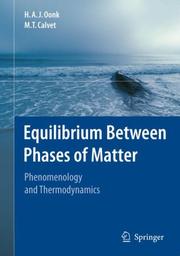| Listing 1 - 2 of 2 |
Sort by
|
Book
ISBN: 0191722944 0199577226 Year: 2011 Publisher: Oxford : Oxford University Press,
Abstract | Keywords | Export | Availability | Bookmark
 Loading...
Loading...Choose an application
- Reference Manager
- EndNote
- RefWorks (Direct export to RefWorks)
An introductory account of the theory of phase transitions and critical phenomena, this book reflects lectures given by the authors to graduate students at their departments and is thus classroom-tested to help beginners enter the field.

ISBN: 140206408X 1402061234 9048175429 9781402061233 9781402064081 Year: 2008 Publisher: Dordrecht : Springer Netherlands : Imprint: Springer,
Abstract | Keywords | Export | Availability | Bookmark
 Loading...
Loading...Choose an application
- Reference Manager
- EndNote
- RefWorks (Direct export to RefWorks)
The phase behaviour of materials and their thermodynamic properties are a central subject in all fields of materials research. The first Volume of the work, meant for graduate students in chemistry, geology, physics, and metallurgy, and their engineering counterparts, is split up in three levels, such that from level to level the portion and importance of thermodynamics and mathematics are increased. In the ground level it is shown that the basic principles of phase equilibria can be understood without the use of thermodynamics – be it that the concept of chemical potential is introduced right from the beginning. The intermediate level is an introduction to thermodynamics; culminating in the Gibbs energy as the arbiter for equilibrium – demonstrated for systems where the phases in equilibrium are pure substances. In the third level the accent is on binary systems, where one or more phases are solutions of the components. Explicit relationships between the variables are derived for equilibria involving ideal mixtures and ideal dilute solutions. Non-ideal systems are treated from three different angles – geometrically, analytically, and numerically. Throughout the work high priority is given to the thermodynamic assessment of experimental data; numerous end-of-chapter exercises and their solutions are included. The work is useful for scientists as an introduction and a reference book. Audience: Students, teachers, and scientists in chemistry, chemical engineering, geology and geophysics, metallurgy, and related branches of materials science.
Phase rule and equilibrium. --- Thermodynamics. --- Chemistry, Physical and theoretical --- Dynamics --- Mechanics --- Physics --- Heat --- Heat-engines --- Quantum theory --- Critical phenomena (Physics) --- Equilibrium --- Chemical equilibrium --- Chemical systems --- Critical point --- Chemistry, Physical organic. --- Materials. --- Geology. --- Physical geography. --- Physical Chemistry. --- Materials Science, general. --- Geophysics/Geodesy. --- Geography --- Geognosy --- Geoscience --- Earth sciences --- Natural history --- Engineering --- Engineering materials --- Industrial materials --- Engineering design --- Manufacturing processes --- Chemistry, Physical organic --- Chemistry, Organic --- Materials --- Physical chemistry. --- Materials science. --- Geophysics. --- Geological physics --- Terrestrial physics --- Material science --- Physical sciences --- Chemistry, Theoretical --- Physical chemistry --- Theoretical chemistry --- Chemistry
| Listing 1 - 2 of 2 |
Sort by
|

 Search
Search Feedback
Feedback About UniCat
About UniCat  Help
Help News
News